Australian Open, Melbourne
January 15, 1996; 128 Draw (16 seeded) – $3,180,318; Surface – Hard
1995, it was a year of amazing dominance of three players: Pete Sampras, Andre Agassi and Thomas Muster. When the Australian Open ’96 kicked off, it seemed almost impossible that the trophy would lift someone else than one of these three guys, however, Sampras faced an opponent, who played a match of his life, Agassi and Muster suffered slight leg injuries in Melbourne which eventually led to their failures, and any representative of the Big 3 managed to advance to the final. Boris Becker was a man taking advantage of it. The German came to Melbourne not having won a Grand Slam title in 5 years, he hadn’t even won a match at the Australian Open since 1993. In the first two rounds he barely escaped defeats to rather unknown young guys at the time (Greg Rusedski, Thomas Johansson), but survived, and since then delivered the most comprehensive tennis of his career to the very end…. The last Australian Open with net-judges.
All scorelines
First round: Herald Wire Services
Brutal heat gave way to beautiful weather as the Australian Open began today with an easy victory by Michael Chang and a tough win by two-time champion Jim Courier. A day after 102-degree heat baked the courts for the final practices, temperatures dropped to the 70s to give the year’s first Grand Slam event a pleasant kickoff. Chang, No. 5, became the first seeded player to win, routing David Rikl 6-2, 6-1, 6-2 in 90 minutes. “It was a good first match for me,” Chang said. “He’s a sneaky little player. He hits shots you wouldn’t expect him to hit.” No. 8 Courier squeaked past Johan Van Herck 7-5, 7-6(1), 6-4. Despite winning the Australian in 1992 and 1993, Courier showed little enthusiasm on court and sounded even less confident off it. “They don’t hurt,” Courier said of his previous Australian titles, “but you can’t put too much emphasis on them. That was then, and this is now.” Mark Philippoussis, playing in his hometown, won the first match on Center Court, 7-6(3), 6-0, 6-1 against Nicolas Kiefer [166]. Both guys were teenagers at the time. No. 6 Yevgeny Kafelnikov had an easy time beating Frabrice Santoro 6-1, 6-1, 7-5, while No. 9 Wayne Ferreira struggled past Jonathan Stark 6-2, 6-1, 3-6, 3-6, 7-5. No more chances for Andre Agassi. Not after the way Agassi missed a step on a spiral stair-case in his hotel room, banged his right kneecap on an iron rod, and wound up with a swelling that looked as if he’d been hit by the guy who whacked Nancy Kerrigan. “I got a little confused, I guess,” a chagrined Agassi said. “I was just trying to get down the thing with my bag, and I just missed the step and my knee went into it. I’m not proud of it.” Agassi’s inauspicious start in defense of his Australian Open title in Melbourne went further than a mere bruise wrapped in layers of bandages. It very nearly ended in the biggest upset in Grand Slam history. Two points from defeat in four sets against qualifier Gaston Etlis [133] of Argentina, Agassi 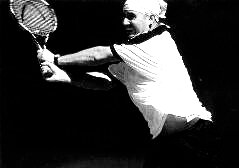 barely pulled out a 3-6, 7-6(2), 4-6, 7-6(5), 6-3 victory yesterday in 3 hours, 17 minutes. No Grand Slam defending champion had ever lost in the first round to a qualifier. Only once before had a defending men’s champion gone out in his first match – Roscoe Tanner at the Australian in 1977 (lost in five sets to Chris Lewis). Agassi, seeded No. 2, had never heard of Etlis, but the Argentine played a drop-and-lob game, a smart, teasing style that took advantage of Agassi’s injury. “I basically just couldn’t jump off the mark and drive with that knee,” Agassi said. “That’s why he would have the nerve to hit so many drop shots.” Agassi, however, wore a thick bandage around his right knee, which swelled Sunday and hurt, he said, as if he’d been hit by a hammer. He said the bruise inflamed tendons and nerves in his knee, which he treated with ice and anti-inflammatory pills. “I had trouble pushing off entirely in either direction,” Agassi said. Etlis’ first serves, barely more than 100 mph (160 kp/h), clipped the corners, perfect placements that even Agassi, the game’s best returner, couldn’t touch. In one game, Etlis saved three break points with three aces, holding to 4:3 in the first set. “He did what he did well, keeping me moving and dropping in shots,” Agassi said, “but he couldn’t finish it off. He was getting pretty creative with finding ways to lose it. Finishing it often is the most difficult part. I was pretty lucky today, and pretty unlucky last night.” Etlis led 4:0* in the second set, and was close to winning at 5:3 in the fourth-set tiebreaker; earlier in the set he led 4:1* (40/30)! “I had the urge to call home to Buenos Aires,” Etlis said of his lead in the fourth. “I wanted to call my father, my mother, my coach. But now… ” “It just proves it doesn’t matter how much money you’ve got, you can still fall downstairs,” Agassi’s coach, Brad Gilbert said. “I would have paid $500 not to have watched that match.” Pete Sampras, the men’s No. 1, showed few lingering effects of the flu that delayed his arrival as he played mostly from the baseline to bedevil Tasmanian Richard Fromberg 7-5, 6-3, 6-2. Sampras, who saved all 10 of the break-points against him, didn’t bother cranking up his big serve, hitting only four aces to Fromberg’s 11. Instead, Sampras, the 1994 champion, contented himself by staying back and picking his spots to charge the net. That worked to perfection as he put away 11 volley winners to Fromberg’s one. Sampras said he is over the flu that spoiled his warm-up plans for the Grand Slam event. “I thought I hit the ball pretty well, but didn’t serve great,” he said. Boris Becker caught himself just in time to push Greg Rusedski [33] into a fifth set Tuesday night. And when it comes to five-setters, no current player has won more. He won, 6-4, 3-6, 4-6, 6-3, 6-3, in 2 hours 49 minutes. “I think Boris, if you just give him a little bit of a chance, he usually makes it go forever and he just gets so pumped and his level increases tremendously.
barely pulled out a 3-6, 7-6(2), 4-6, 7-6(5), 6-3 victory yesterday in 3 hours, 17 minutes. No Grand Slam defending champion had ever lost in the first round to a qualifier. Only once before had a defending men’s champion gone out in his first match – Roscoe Tanner at the Australian in 1977 (lost in five sets to Chris Lewis). Agassi, seeded No. 2, had never heard of Etlis, but the Argentine played a drop-and-lob game, a smart, teasing style that took advantage of Agassi’s injury. “I basically just couldn’t jump off the mark and drive with that knee,” Agassi said. “That’s why he would have the nerve to hit so many drop shots.” Agassi, however, wore a thick bandage around his right knee, which swelled Sunday and hurt, he said, as if he’d been hit by a hammer. He said the bruise inflamed tendons and nerves in his knee, which he treated with ice and anti-inflammatory pills. “I had trouble pushing off entirely in either direction,” Agassi said. Etlis’ first serves, barely more than 100 mph (160 kp/h), clipped the corners, perfect placements that even Agassi, the game’s best returner, couldn’t touch. In one game, Etlis saved three break points with three aces, holding to 4:3 in the first set. “He did what he did well, keeping me moving and dropping in shots,” Agassi said, “but he couldn’t finish it off. He was getting pretty creative with finding ways to lose it. Finishing it often is the most difficult part. I was pretty lucky today, and pretty unlucky last night.” Etlis led 4:0* in the second set, and was close to winning at 5:3 in the fourth-set tiebreaker; earlier in the set he led 4:1* (40/30)! “I had the urge to call home to Buenos Aires,” Etlis said of his lead in the fourth. “I wanted to call my father, my mother, my coach. But now… ” “It just proves it doesn’t matter how much money you’ve got, you can still fall downstairs,” Agassi’s coach, Brad Gilbert said. “I would have paid $500 not to have watched that match.” Pete Sampras, the men’s No. 1, showed few lingering effects of the flu that delayed his arrival as he played mostly from the baseline to bedevil Tasmanian Richard Fromberg 7-5, 6-3, 6-2. Sampras, who saved all 10 of the break-points against him, didn’t bother cranking up his big serve, hitting only four aces to Fromberg’s 11. Instead, Sampras, the 1994 champion, contented himself by staying back and picking his spots to charge the net. That worked to perfection as he put away 11 volley winners to Fromberg’s one. Sampras said he is over the flu that spoiled his warm-up plans for the Grand Slam event. “I thought I hit the ball pretty well, but didn’t serve great,” he said. Boris Becker caught himself just in time to push Greg Rusedski [33] into a fifth set Tuesday night. And when it comes to five-setters, no current player has won more. He won, 6-4, 3-6, 4-6, 6-3, 6-3, in 2 hours 49 minutes. “I think Boris, if you just give him a little bit of a chance, he usually makes it go forever and he just gets so pumped and his level increases tremendously. 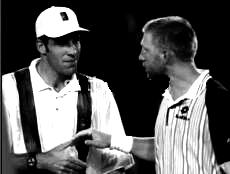 He showed why he is a great player, and great players can manage to turn those matches around,” Rusedski said. The crucial moment of the match came at 1-all in the 4th set, when Becker saved a break point. It pushed Becker’s five-set record to 29-13, one victory ahead of Aaron Krickstein, who is 28-9. Only Stefan Edberg has played more five-setters. He won, 7-6(6), 7-5, 3-6, 5-7, 6-1, against Jiri Novak, bringing his record to 26-18. Three of his four aces came in the final set. Edberg, who turns 30 on Friday, has won six Grand Slam titles, including the Australian Open in 1985 and 1987. “I think I can win another slam, starting here,” he said. And indeed, he won the tournament… in doubles (along with Petr Korda). At the end of 1995, Edberg announced that ’96 would be his last professional season on tour.
He showed why he is a great player, and great players can manage to turn those matches around,” Rusedski said. The crucial moment of the match came at 1-all in the 4th set, when Becker saved a break point. It pushed Becker’s five-set record to 29-13, one victory ahead of Aaron Krickstein, who is 28-9. Only Stefan Edberg has played more five-setters. He won, 7-6(6), 7-5, 3-6, 5-7, 6-1, against Jiri Novak, bringing his record to 26-18. Three of his four aces came in the final set. Edberg, who turns 30 on Friday, has won six Grand Slam titles, including the Australian Open in 1985 and 1987. “I think I can win another slam, starting here,” he said. And indeed, he won the tournament… in doubles (along with Petr Korda). At the end of 1995, Edberg announced that ’96 would be his last professional season on tour.
Second round: AP
Tempers flared predictably when Jim Courier and Jeff Tarango [74] dueled Wednesday at the Australian Open, an ugly American match of umpire baiting and racket throwing. Courier, twice champion of the Australian, vented his frustration by flinging his racket and cursing to the sky. Tarango expressed his displeasure with line calls by keeping up a running argument with the umpire. The antics of both players spiced a baseline confrontation Courier finally won with a run of nine straight games that brought him back from *1:4 down in the 3rd set to a 7-5, 6-7(2), 6-4, 6-3 victory. Courier repaid the favor when he was serving for the 2nd set at 5:3. Apparently trying too hard to finish it, he dropped service at 15/40 and then was unable to cash in on two set points, with Tarango serving at 4:5 and 5:6. Tarango saved the first with an ace and the second by suddenly shifting to slow-ball tactics that led Courier to hit a backhand long. More Courier errors gave Tarango the tiebreaker. Tarango complained to the umpire a couple of times about Courier getting away without a penalty for foul language. “Jeff feels punished,” Courier said. “He feels that if he were in my shoes, he would have been hit with a warning.” Said Tarango: “I’m restraining myself, and it would be very relaxing to know that I could throw my racket. There’s a lot of stuff in the back of my head that I have to keep suppressed.” Tarango berated the umpire over line calls numerous times, especially long and loud while serving at 1:1 in the 3rd. He held for 2:1, took a three-minute injury timeout to have a trainer attend to his sore right foot, and promptly broke Courier’s serve, starting the game with a scorching forehand down the line. But trailing, 1:4, Courier stepped up the pressure and took nine straight games, going ahead, 4:0*, in the final set before winning on one final break. Courier smiled at the first question posed at him after the match: “How does it feel to play against a reprobate?” Courier responded that he has known Tarango since he was 12, and “Jeff has always been a character. He’s a fine tennis player, but unfortunately that’s been overshadowed by what happened at Wimbledon. He’s an intelligent guy, always looking for a way to provoke you, get a rise out of you. I like Jeff, but I might be in a  minority. When you become a marked man, people are a little bit rougher on you.” Courier referred to Tarango’s famous default at Wimbledon ’95. Michael Chang, No. 5, advanced with a quieter and easier 6-1, 6-3, 6-3 victory over Jakob Hlasek. “The strength of his game is in the serve, and the return, and from the back he is just fantastic,” Hlasek said. “He really played well today. He came in with some good shots, the right passing shot. He always came up with a good answer.” The crowd went wild when Chang used his sturdy legs to chase down shots Hlasek rifled into a corner of the court. Two-time champion Stefan Edberg bade farewell to Australian fans after a 6-4, 2-6, 4-6, 6-2, 6-3 loss to qualifier Jean-Philippe Fleurian. Edberg saved two match points but couldn’t save a third as Fleurian, ranked 153, drove a forehand cross-court and out of Edberg’s reach. The packed crowd at Court 1 gave Edberg a five-minute ovation when he left… “It felt good in one way, bad in another way,” Edberg said of the crowd’s cheers. The defending champion Andre Agassi – competing with Pete Sampras and Thomas Muster for the top spot in the rankings – belted winners from all angles tonight in a 6-4, 6-2, 6-3 victory over fellow American Vincent Spadea. Agassi banged his right knee into a post on a spiral staircase in his hotel room Sunday night and, hobbled by the swelling, barely escaped being upset Monday by Argentine qualifier Gaston Etlis in a five-set match. Spadea stayed with the No. 2 seed for most of the first set, even breaking service once, before beginning to feel the sting of Agassi’s rockets. Agassi was frustrated by his erratic first serve. His shouted description of it at one point in the sixth game of the third set brought him a code violation for an obscenity. When he missed his next first serve, the ball bounced back to him from the net and Agassi swung blindly at it behind his back and nearly hit a ball-boy in the head. Had he faced Spadea on Monday, he would now be out, he said later. “It’s definitely a lot better today. I was moving close to par,” said Agassi, who has been treating his knee with electrical stimulation and ice and holding back on practice. “By next match, it should be 100 percent.” Another famous name returned to prominence. Patrick McEnroe, younger brother of former No. 1 John, overcame a miserable start to upset No. 14 Andrei Medvedev of Ukraine 0-6, 2-6, 6-2, 6-3, 6-2. The younger McEnroe, ranked No. 57, was a semifinalist in 1991. No. 9 Wayne Ferreira of South Africa failed to overcome a hamstring injury, losing 6-1, 6-3, 6-0 to Karol Kucera [78] of Slovakia. Kucera lost just one game more in his first round against doubles specialist David Adams (7-5 6-0 6-0). No. 3 Muster advanced to the third round with a 6-4, 6-4, 1-6, 7-6(4) victory over Javier Frana of Argentina. Boris Becker escaped defeat Thursday but not before testing his limits and nerves for the second match in a row at the Australian Open, rallying from a two-set deficit to beat Thomas Johansson [115] 4-6, 3-6, 6-2, 6-1, 6-4. “I am not doing it on purpose, trust me,” said the fourth-seeded Becker. “To tell you the truth, I would rather prefer a
minority. When you become a marked man, people are a little bit rougher on you.” Courier referred to Tarango’s famous default at Wimbledon ’95. Michael Chang, No. 5, advanced with a quieter and easier 6-1, 6-3, 6-3 victory over Jakob Hlasek. “The strength of his game is in the serve, and the return, and from the back he is just fantastic,” Hlasek said. “He really played well today. He came in with some good shots, the right passing shot. He always came up with a good answer.” The crowd went wild when Chang used his sturdy legs to chase down shots Hlasek rifled into a corner of the court. Two-time champion Stefan Edberg bade farewell to Australian fans after a 6-4, 2-6, 4-6, 6-2, 6-3 loss to qualifier Jean-Philippe Fleurian. Edberg saved two match points but couldn’t save a third as Fleurian, ranked 153, drove a forehand cross-court and out of Edberg’s reach. The packed crowd at Court 1 gave Edberg a five-minute ovation when he left… “It felt good in one way, bad in another way,” Edberg said of the crowd’s cheers. The defending champion Andre Agassi – competing with Pete Sampras and Thomas Muster for the top spot in the rankings – belted winners from all angles tonight in a 6-4, 6-2, 6-3 victory over fellow American Vincent Spadea. Agassi banged his right knee into a post on a spiral staircase in his hotel room Sunday night and, hobbled by the swelling, barely escaped being upset Monday by Argentine qualifier Gaston Etlis in a five-set match. Spadea stayed with the No. 2 seed for most of the first set, even breaking service once, before beginning to feel the sting of Agassi’s rockets. Agassi was frustrated by his erratic first serve. His shouted description of it at one point in the sixth game of the third set brought him a code violation for an obscenity. When he missed his next first serve, the ball bounced back to him from the net and Agassi swung blindly at it behind his back and nearly hit a ball-boy in the head. Had he faced Spadea on Monday, he would now be out, he said later. “It’s definitely a lot better today. I was moving close to par,” said Agassi, who has been treating his knee with electrical stimulation and ice and holding back on practice. “By next match, it should be 100 percent.” Another famous name returned to prominence. Patrick McEnroe, younger brother of former No. 1 John, overcame a miserable start to upset No. 14 Andrei Medvedev of Ukraine 0-6, 2-6, 6-2, 6-3, 6-2. The younger McEnroe, ranked No. 57, was a semifinalist in 1991. No. 9 Wayne Ferreira of South Africa failed to overcome a hamstring injury, losing 6-1, 6-3, 6-0 to Karol Kucera [78] of Slovakia. Kucera lost just one game more in his first round against doubles specialist David Adams (7-5 6-0 6-0). No. 3 Muster advanced to the third round with a 6-4, 6-4, 1-6, 7-6(4) victory over Javier Frana of Argentina. Boris Becker escaped defeat Thursday but not before testing his limits and nerves for the second match in a row at the Australian Open, rallying from a two-set deficit to beat Thomas Johansson [115] 4-6, 3-6, 6-2, 6-1, 6-4. “I am not doing it on purpose, trust me,” said the fourth-seeded Becker. “To tell you the truth, I would rather prefer a 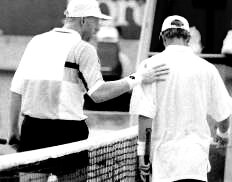 very quiet day at the office.” Becker has not had many at the Australian Open. He won here in 1991, claiming the No. 1 ranking for the first time. Since then, he has lost his touch in Melbourne, never advancing past the third round and losing in the first round in 1993 and 1995. If not for some timely serving and returning against Briton Greg Rusedski, he could have added 1996 to that litany, but Becker survived in five sets. And to hear Becker tell it, he survived, in part, because the boisterous, young Swedish fans who are a fixture at this event, made him angry. “I understand a bit of Swedish after playing for all these years against all my Swedish friends, and they weren’t very nice all the time with what they were saying,” Becker complained. For two sets, Johansson, who has jumped more than 350 places in the rankings in the past year, was blasting away with remarkable accuracy, but the match turned at 2:2 in the third set when Becker rallied from 40/0 to hold his serve. He saved the first break point with a backhand volley to the corner that appeared well out. Johansson argued briefly and was never quite the same after that, while Becker was more his customary self. When it ended, he pointed disdainfully in the direction of the Swedish fans as he walked toward the net. But the Swedes with the painted faces will get another crack at Becker in the third round when he faces their countryman Magnus Larsson, who was flirting regularly with the top 10 until breaking his right foot last June… Melbourne is Mark Philippoussis‘ town, a place where there are more Greeks than in any city except Athens. Sampras is of Greek heritage, too, but he won’t be the fans’ favorite this time. Yet, Philippoussis’ home-court advantage may also be his burden. The weight of this nation’s hopes for a new tennis star – someone to bring back the glory of Laver, Rosewall, Newcombe, all have leaned mightily on him. That became most obvious when he tried too hard and lost too soon in a tuneup tournament in Sydney. He tried to crush every shot against Britain’s Tim Henman, who called him “one dimensional.” Philippoussis’ coach, Nick Bollettieri, sat him down and made him watch videotape of that match, to see how foolishly he played. Philippoussis came away chastened and resolved to harness some of his power, go for angles and touch shots more. He’s done that in two matches so far this week, but he’ll have to do that and more to beat Pete Sampras. As far as the pressure of living up to his countryman’s hopes, Philippoussis is doing what he can to play it down as if it were just another match. He knows it isn’t. It’s a match against the No. 1 player, but Philippoussis can’t let himself think that way. “I’m just going to not think about playing Sampras,” he said. “I won’t worry about the whole outcome or the whole thing. It might be a great atmosphere out there, so I will just enjoy myself.” He may not enjoy himself so much if Sampras keeps stepping up his game as he did in Thursday’s match, when he served 20 aces against fellow American Michael Joyce in a 3-6, 6-3, 6-4, 6-4 victory.
very quiet day at the office.” Becker has not had many at the Australian Open. He won here in 1991, claiming the No. 1 ranking for the first time. Since then, he has lost his touch in Melbourne, never advancing past the third round and losing in the first round in 1993 and 1995. If not for some timely serving and returning against Briton Greg Rusedski, he could have added 1996 to that litany, but Becker survived in five sets. And to hear Becker tell it, he survived, in part, because the boisterous, young Swedish fans who are a fixture at this event, made him angry. “I understand a bit of Swedish after playing for all these years against all my Swedish friends, and they weren’t very nice all the time with what they were saying,” Becker complained. For two sets, Johansson, who has jumped more than 350 places in the rankings in the past year, was blasting away with remarkable accuracy, but the match turned at 2:2 in the third set when Becker rallied from 40/0 to hold his serve. He saved the first break point with a backhand volley to the corner that appeared well out. Johansson argued briefly and was never quite the same after that, while Becker was more his customary self. When it ended, he pointed disdainfully in the direction of the Swedish fans as he walked toward the net. But the Swedes with the painted faces will get another crack at Becker in the third round when he faces their countryman Magnus Larsson, who was flirting regularly with the top 10 until breaking his right foot last June… Melbourne is Mark Philippoussis‘ town, a place where there are more Greeks than in any city except Athens. Sampras is of Greek heritage, too, but he won’t be the fans’ favorite this time. Yet, Philippoussis’ home-court advantage may also be his burden. The weight of this nation’s hopes for a new tennis star – someone to bring back the glory of Laver, Rosewall, Newcombe, all have leaned mightily on him. That became most obvious when he tried too hard and lost too soon in a tuneup tournament in Sydney. He tried to crush every shot against Britain’s Tim Henman, who called him “one dimensional.” Philippoussis’ coach, Nick Bollettieri, sat him down and made him watch videotape of that match, to see how foolishly he played. Philippoussis came away chastened and resolved to harness some of his power, go for angles and touch shots more. He’s done that in two matches so far this week, but he’ll have to do that and more to beat Pete Sampras. As far as the pressure of living up to his countryman’s hopes, Philippoussis is doing what he can to play it down as if it were just another match. He knows it isn’t. It’s a match against the No. 1 player, but Philippoussis can’t let himself think that way. “I’m just going to not think about playing Sampras,” he said. “I won’t worry about the whole outcome or the whole thing. It might be a great atmosphere out there, so I will just enjoy myself.” He may not enjoy himself so much if Sampras keeps stepping up his game as he did in Thursday’s match, when he served 20 aces against fellow American Michael Joyce in a 3-6, 6-3, 6-4, 6-4 victory.
Third round: AP, Steve Wilstein
 In 1990, a remarkably composed 19-year-old of Greek origin played nearly flawless power tennis against his elders in his national tennis championship. After Saturday’s stunning straight-set loss to Mark Philippoussis [39] in the third round of the Australian Open, Pete Sampras now knows what it feels like to be on the receiving end of such a performance. Philippoussis, a remarkably composed 19-year-old Australian whose father emigrated from Greece, was nearly flawless throughout his 6-4, 7-6(9), 7-6(3) victory on center court. He came back from a *2:5 deficit in the 2nd set tie-break with three winners, saving two set points (5:6 & 7:8) – another two winners (!), served 29 aces, some as fast 128 mph. He covered the net like the goalkeeper his father once was and ripped winners and passing shots relentlessly off both sides. He also consistently attacked Sampras’ second serve. Most remarkable of all was that he never cracked. From start to finish, he was rearing back, swinging for the lines and hitting them against the world’s No. 1 player, who had won the past two Grand Slam events. When Philippoussis walked off the court a winner, with 13,000 fans on their feet and screaming, the teen-ager who was born and reared in Melbourne was already the biggest thing to hit Australian tennis since Pat Cash. “Tonight was like nothing I’ve felt before,” said Philippoussis, who is 6 feet 4 inches and 200 pounds and plays like it. “I felt so confident on the serve. I felt like I could just toss it up and hit an ace how I wanted to. It was an unbelievable feeling.” Philippoussis, nicknamed “Scud” for obvious reasons, has a long way to go to match Sampras, who rolled all the way to the 1990 U.S. Open title at age 19. The Aussie’s fourth-round opponent will be countryman Mark Woodforde, and after Saturday night, he certainly is ripe for a letdown. If he gets past Woodforde, he probably will have to deal with No. 11 Goran Ivanisevic or No. 7 Thomas Enqvist in the quarterfinals. “If Mark can play at the level that he played tonight, he’s got the capability to win here, sure,” Sampras said. “But that’s a big if.” The indoor conditions certainly helped Philippoussis. With no wind to trouble his service toss or throw off his high-risk ground-strokes, he was able to keep a consistent groove. But it is one thing for a youngster to put himself in position to win a big match. It is quite another to close it out. “I was trying to keep my emotions back as much as I could,” Philippoussis said. “I didn’t want to get too pumped up.” Saturday night’s defeat was particularly damaging to Sampras because it will cost him the No. 1 ranking that he reclaimed from Andre Agassi in November. Sampras needed to reach at least the quarterfinals to have a chance of holding onto the top spot. Now, either Agassi or Thomas Muster, a winner of 12 tournaments including the French Open last year, will be No. 1 when this tournament ends. “It’ll take a little time to get over this, but I’ve lost before, and I’ll have to bounce back,” Sampras said. “But hopefully I can regain that No. 1 ranking. Certainly, I measure my year on the majors and this is pretty disappointing.” The slogan on Michael Chang‘s T- shirt today might well have been his motto, ‘Go To Work’ something he’s been doing here with little fuss and much success. Chang’s latest victory, 6-2, 6-2, 7-6(6) over Guillaume Raoux, put him into the fourth round with less strain than any of the seeded players ahead of him. Chang’s way into the fifth round became a little easier when No. 11 Richard Krajicek retired with a back injury in the third set against Jean-Philippe Fleurian (6-4, 3-6, 2-2 ret.). Though Fleurian beat former champion Stefan Edberg in the previous round, he’s likely to find Chang a much tougher opponent. “I’m 30
In 1990, a remarkably composed 19-year-old of Greek origin played nearly flawless power tennis against his elders in his national tennis championship. After Saturday’s stunning straight-set loss to Mark Philippoussis [39] in the third round of the Australian Open, Pete Sampras now knows what it feels like to be on the receiving end of such a performance. Philippoussis, a remarkably composed 19-year-old Australian whose father emigrated from Greece, was nearly flawless throughout his 6-4, 7-6(9), 7-6(3) victory on center court. He came back from a *2:5 deficit in the 2nd set tie-break with three winners, saving two set points (5:6 & 7:8) – another two winners (!), served 29 aces, some as fast 128 mph. He covered the net like the goalkeeper his father once was and ripped winners and passing shots relentlessly off both sides. He also consistently attacked Sampras’ second serve. Most remarkable of all was that he never cracked. From start to finish, he was rearing back, swinging for the lines and hitting them against the world’s No. 1 player, who had won the past two Grand Slam events. When Philippoussis walked off the court a winner, with 13,000 fans on their feet and screaming, the teen-ager who was born and reared in Melbourne was already the biggest thing to hit Australian tennis since Pat Cash. “Tonight was like nothing I’ve felt before,” said Philippoussis, who is 6 feet 4 inches and 200 pounds and plays like it. “I felt so confident on the serve. I felt like I could just toss it up and hit an ace how I wanted to. It was an unbelievable feeling.” Philippoussis, nicknamed “Scud” for obvious reasons, has a long way to go to match Sampras, who rolled all the way to the 1990 U.S. Open title at age 19. The Aussie’s fourth-round opponent will be countryman Mark Woodforde, and after Saturday night, he certainly is ripe for a letdown. If he gets past Woodforde, he probably will have to deal with No. 11 Goran Ivanisevic or No. 7 Thomas Enqvist in the quarterfinals. “If Mark can play at the level that he played tonight, he’s got the capability to win here, sure,” Sampras said. “But that’s a big if.” The indoor conditions certainly helped Philippoussis. With no wind to trouble his service toss or throw off his high-risk ground-strokes, he was able to keep a consistent groove. But it is one thing for a youngster to put himself in position to win a big match. It is quite another to close it out. “I was trying to keep my emotions back as much as I could,” Philippoussis said. “I didn’t want to get too pumped up.” Saturday night’s defeat was particularly damaging to Sampras because it will cost him the No. 1 ranking that he reclaimed from Andre Agassi in November. Sampras needed to reach at least the quarterfinals to have a chance of holding onto the top spot. Now, either Agassi or Thomas Muster, a winner of 12 tournaments including the French Open last year, will be No. 1 when this tournament ends. “It’ll take a little time to get over this, but I’ve lost before, and I’ll have to bounce back,” Sampras said. “But hopefully I can regain that No. 1 ranking. Certainly, I measure my year on the majors and this is pretty disappointing.” The slogan on Michael Chang‘s T- shirt today might well have been his motto, ‘Go To Work’ something he’s been doing here with little fuss and much success. Chang’s latest victory, 6-2, 6-2, 7-6(6) over Guillaume Raoux, put him into the fourth round with less strain than any of the seeded players ahead of him. Chang’s way into the fifth round became a little easier when No. 11 Richard Krajicek retired with a back injury in the third set against Jean-Philippe Fleurian (6-4, 3-6, 2-2 ret.). Though Fleurian beat former champion Stefan Edberg in the previous round, he’s likely to find Chang a much tougher opponent. “I’m 30 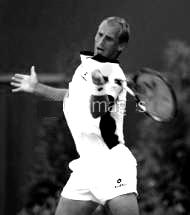 years old,” Fleurian said, “so it’s been a long wait to have this kind of good luck.” The qualifier Fleurian advanced to the last 16 of a Grand Slam tournament for the first time in 31st attempt. As the rubberized hardcourts burned with temperatures near 90 degrees, the heat took its toll on players and fans alike. No. 3 Thomas Muster, as fit as anyone, looked exhausted at the end of his 6-4, 7-6(9), 6-4 over Nicklas Kulti, saving five set points in the 2nd set. Chang is playing with the ease and confidence of a man who truly believes he can win this Grand Slam event, no matter that most people think it’ll come down to No. 1 Pete Sampras against No. 2 Andre Agassi. “I think I’m gaining on them,” Chang said. “My game is continuing to improve, and I think that Pete and Andre have kind of reached their peak of their tennis careers. I kind of still feel my best years of tennis are still ahead of me.” [He was wrong, 1996 was his last big season]. Chang appeared set for a short day at work after breaking Raoux at love in the third set’s first game. But Raoux began hitting sizzling angled shots and deft drops that even the speedy Chang couldn’t reach. Raoux broke back immediately and then, serving at 4:4, saved two break points with an angled volley and a Chang miss. Raoux jumped to a 3:1 lead in the tiebreaker, attacking one of Chang’s second serves to set up a volley winner. But a volley miss by Raoux evened things. Double-faults by each evened the score again at 5:5 before Chang clinched the match on a forehand hit long by Raoux and a service winner. Andre Agassi wasted no time reasserting his dominance after losing the first set of his third-round match to qualifier Steve Bryan [225], a fellow American ranked 225th. He won 4-6, 6-0, 6-2, 6-1. Agassi stated: “I was really playing well for the last three sets, contrary to popular belief.” His next opponent will be Sweden’s Jonas Bjorkman, ranked 34th, who ousted American Todd Martin, the 15th seed, 6-3, 3-6, 6-3, 2-6, 6-4 in a nearly three-hour match. Agassi’s troubles so far “have been good to see,” said Bjorkman, who never has played him before. Muster said his ankle hurt for the first few points after he twisted it, but once he kept moving it improved. “Once the tape loosens up a bit and you feel that your confidence is coming back, running balls down, then it was all right,” he said, adding that there was no swelling or ligament damage. At the beginning, he said, “I wasn’t hitting the ball as I should have been. Actually, after I twisted, I got a bit of adrenalin, I guess, and I think I played better after that.” The Austrian clay court specialist said the Australian Open surface is very sticky, making it easy to twist an ankle. For sheer drama, Jim Courier may never play a match that will top the one a year ago at the Australian Open when Pete Sampras wept uncontrollably on court for his cancer-stricken coach and still won. For utter tension, Courier may never experience a match more riveting than his 4-hour, 31-minute victory, from Friday night to Saturday morning, over Australian Todd Woodbridge [35] and a crowd that treated the former two-time champion like an evil invader. Courier’s final forehand into the corner, a shot the exhausted Woodbridge couldn’t return, came at 1:13 a.m and closed out a 6-3, 6-7(2), 7-6(3), 3-6, 8-6 win that kept 15,000 fans screaming to the end. Before Courier finished it off, he wasted a set point on serve in the 2nd set, a 5:2 lead in the 3rd (Woodbridge served at 6:5 in that set), and match points in two different games, he also saved three mini-match points at 5-all. “It was a good, tough-fought match, and those are fun to win,” Courier said. “The crowd was on me tonight. They were telling me to double-fault. Australians are known for their fair play, in general. I think probably a few
years old,” Fleurian said, “so it’s been a long wait to have this kind of good luck.” The qualifier Fleurian advanced to the last 16 of a Grand Slam tournament for the first time in 31st attempt. As the rubberized hardcourts burned with temperatures near 90 degrees, the heat took its toll on players and fans alike. No. 3 Thomas Muster, as fit as anyone, looked exhausted at the end of his 6-4, 7-6(9), 6-4 over Nicklas Kulti, saving five set points in the 2nd set. Chang is playing with the ease and confidence of a man who truly believes he can win this Grand Slam event, no matter that most people think it’ll come down to No. 1 Pete Sampras against No. 2 Andre Agassi. “I think I’m gaining on them,” Chang said. “My game is continuing to improve, and I think that Pete and Andre have kind of reached their peak of their tennis careers. I kind of still feel my best years of tennis are still ahead of me.” [He was wrong, 1996 was his last big season]. Chang appeared set for a short day at work after breaking Raoux at love in the third set’s first game. But Raoux began hitting sizzling angled shots and deft drops that even the speedy Chang couldn’t reach. Raoux broke back immediately and then, serving at 4:4, saved two break points with an angled volley and a Chang miss. Raoux jumped to a 3:1 lead in the tiebreaker, attacking one of Chang’s second serves to set up a volley winner. But a volley miss by Raoux evened things. Double-faults by each evened the score again at 5:5 before Chang clinched the match on a forehand hit long by Raoux and a service winner. Andre Agassi wasted no time reasserting his dominance after losing the first set of his third-round match to qualifier Steve Bryan [225], a fellow American ranked 225th. He won 4-6, 6-0, 6-2, 6-1. Agassi stated: “I was really playing well for the last three sets, contrary to popular belief.” His next opponent will be Sweden’s Jonas Bjorkman, ranked 34th, who ousted American Todd Martin, the 15th seed, 6-3, 3-6, 6-3, 2-6, 6-4 in a nearly three-hour match. Agassi’s troubles so far “have been good to see,” said Bjorkman, who never has played him before. Muster said his ankle hurt for the first few points after he twisted it, but once he kept moving it improved. “Once the tape loosens up a bit and you feel that your confidence is coming back, running balls down, then it was all right,” he said, adding that there was no swelling or ligament damage. At the beginning, he said, “I wasn’t hitting the ball as I should have been. Actually, after I twisted, I got a bit of adrenalin, I guess, and I think I played better after that.” The Austrian clay court specialist said the Australian Open surface is very sticky, making it easy to twist an ankle. For sheer drama, Jim Courier may never play a match that will top the one a year ago at the Australian Open when Pete Sampras wept uncontrollably on court for his cancer-stricken coach and still won. For utter tension, Courier may never experience a match more riveting than his 4-hour, 31-minute victory, from Friday night to Saturday morning, over Australian Todd Woodbridge [35] and a crowd that treated the former two-time champion like an evil invader. Courier’s final forehand into the corner, a shot the exhausted Woodbridge couldn’t return, came at 1:13 a.m and closed out a 6-3, 6-7(2), 7-6(3), 3-6, 8-6 win that kept 15,000 fans screaming to the end. Before Courier finished it off, he wasted a set point on serve in the 2nd set, a 5:2 lead in the 3rd (Woodbridge served at 6:5 in that set), and match points in two different games, he also saved three mini-match points at 5-all. “It was a good, tough-fought match, and those are fun to win,” Courier said. “The crowd was on me tonight. They were telling me to double-fault. Australians are known for their fair play, in general. I think probably a few 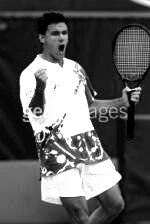 people… just aren’t tennis knowledgeable. It didn’t affect me on the court, but it’s extra satisfying to win because of those people.” When Goran Ivanisevic was berating himself for his mistakes, especially his failure to charge the net more often, someone suggested he change coaches. “What’s he going to tell me? `Goran, go to the net.’ And then the match comes, and I don’t go to the net, and then I fire him and find a new coach, and he says, `Go to the net,'” Ivanisevic replied. “There’s nothing to do with the coach.” Ivanisevic, seeded 10th, lost 6-2, 3-6, 6-4, 6-2 to Italian Renzo Furlan, ranked No. 38, in a third-round match today. “It’s only my fault. I don’t know, I can’t explain,” said the Croatian player, who had 66 unforced errors and seven double faults. “I hit 10 times from the back like an idiot and the ball every time comes to the service line again, again, again, and I never come in,” Ivanisevic said. “I lost 90 percent of the point, very important points, instead of coming in…I have to find the balance to come in more on the slower courts because I’m tall and it’s not easy to pass me.”
people… just aren’t tennis knowledgeable. It didn’t affect me on the court, but it’s extra satisfying to win because of those people.” When Goran Ivanisevic was berating himself for his mistakes, especially his failure to charge the net more often, someone suggested he change coaches. “What’s he going to tell me? `Goran, go to the net.’ And then the match comes, and I don’t go to the net, and then I fire him and find a new coach, and he says, `Go to the net,'” Ivanisevic replied. “There’s nothing to do with the coach.” Ivanisevic, seeded 10th, lost 6-2, 3-6, 6-4, 6-2 to Italian Renzo Furlan, ranked No. 38, in a third-round match today. “It’s only my fault. I don’t know, I can’t explain,” said the Croatian player, who had 66 unforced errors and seven double faults. “I hit 10 times from the back like an idiot and the ball every time comes to the service line again, again, again, and I never come in,” Ivanisevic said. “I lost 90 percent of the point, very important points, instead of coming in…I have to find the balance to come in more on the slower courts because I’m tall and it’s not easy to pass me.”
Fourth round: Christopher Clarey
 Three disparate men dominated men’s tennis in 1995: Pete Sampras, Andre Agassi and that moaning, groaning Austrian baseliner with the fragile left knee and iron will, Thomas Muster. As of Sunday evening, only Agassi was still in the Australian Open. Less than 24 hours after the top-seeded Sampras was stunned by Mark Philippoussis, the third-seeded Muster was upset in the fourth round by Mikael Tillstrom [105] of Sweden, who like Philippoussis has very little Grand Slam experience and lots of talent. Tillstrom’s 7-5, 4-6, 6-3, 6-2 victory struck a serious blow to Muster’s chances of becoming No. 1 at this tournament. Tillstrom took advantage of Muster’s slight injury he’d suffered a round before, implementing phenomenal backhand dropshots throughout the match. Agassi can reclaim the top ranking he lost to Sampras in November by winning his quarterfinal match against Jim Courier. But after Agassi rallied to defeat Jonas Bjorkman [34], 4-6, 6-2, 4-6, 6-1, 6-2, he said: “If I don’t win this tournament, I don’t want to be ranked No. 1.” When Agassi won this event last year, he lost only one set, and that was in the final against Sampras. This year, in his first extensive action since last year’s U.S. Open, he already has lost five. He went five sets in the first round on a bruised knee against the qualifier Gaston Etlis, four sets in the third round against the qualifier Steve Bryan and five more against Bjorkman, one of the world’s best doubles players and the owner of an all-round game. “With these matches under my belt, I could change quickly, but I wouldn’t say I’m at my peak,” Agassi said. Neither is Courier, who won, 7-5, 2-6, 4-6, 6-4, 6-2, Sunday over Marcus Ondruska, a South African with a Munich address. It was Courier’s second consecutive five-set match and second consecutive underwhelming performance from the baseline. “Too many hours, not by choice but by necessity,” said Courier, who holds a 7-5 career edge over Agassi and has won their last six matches, five of which came in 1991 and 1992. “I’m looking forward to it,” Agassi said “I think Jim’s definitely a rock-’em, sock-’em kind of tennis player.” A cocky Russian who talks big and plays fast, Yevgeny Kafelnikov issued a warning today to his rivals at the Australian Open: “Watch out!” Kafelnikov, dubbed “AK-47” by other players, blasted past MaliVai Washington 6-3, 6-2, 6-4 to reach the quarterfinals. The way Kafelnikov figures it, he can beat anyone left in the tournament in the next three rounds and capture his first Grand Slam title. “I’ve got $10 that says you’ll win,” a television interviewer told h)im as he walked off court. “Make it $100, I won’t disappoint you,” Kafelnikov responded. The legal sports books aren’t so sure, making him 11-2 behind favorites Andre Agassi, Michael Chang and Boris Becker. That’s quite a leap of faith for someone who’s never gotten past the semis of a major, someone who has a solid baseline game but no huge weapon, someone who is ranked No. 6 and may have to play Becker next. But shyness and insecurity are not problems for Kafelnikov, even if players like Agassi say he ought to prove himself a little more before popping off. “The player who I never won against (Pete Sampras) is out of the tournament,” Kafelnikov said. “Everybody else, I beat them. So why can’t I win the Australian Open? I feel like I am in very good shape now. I am completely satisfied with the whole aspect of my game, and I’ve got enough confidence to win it.” No. 7 Thomas Enqvist of Sweden also moved into the quarters, beating Italy’s Renzo Furlan 7-5, 6-0, 6-3. The Italian was serving to win the 1st set at 5:4, and lost 14 games in a row! Kafelnikov had been worried only about Sampras, who beat him in their four previous matches. But with Sampras gone in the third round, a loser to Mark Philippoussis, Kafelnikov rates his own chances pretty high. He also rates the 19-year-old Philippoussis’ chance pretty low. And rightly so. Philippoussis lost to countryman Mark Woodforde, 6-2, 6-2, 6-2 two days after beating Sampras. On a day when chilly breezes swirled around Center Court, Philippoussis lacked the composure and control he showed under the closed roof against Sampras. He started out flat and subdued, then couldn’t harness his tremendous power when he fell behind. “It was very hard for me, after beating Sampras, to come back,” Philippoussis said. “I was maybe too relaxed. I wasn’t pumped up enough for the match. When things didn’t go well at the start, I couldn’t get myself pumped up. I don’t know why… It’s a big occasion for me, one of the biggest matches of my life. For a match like
Three disparate men dominated men’s tennis in 1995: Pete Sampras, Andre Agassi and that moaning, groaning Austrian baseliner with the fragile left knee and iron will, Thomas Muster. As of Sunday evening, only Agassi was still in the Australian Open. Less than 24 hours after the top-seeded Sampras was stunned by Mark Philippoussis, the third-seeded Muster was upset in the fourth round by Mikael Tillstrom [105] of Sweden, who like Philippoussis has very little Grand Slam experience and lots of talent. Tillstrom’s 7-5, 4-6, 6-3, 6-2 victory struck a serious blow to Muster’s chances of becoming No. 1 at this tournament. Tillstrom took advantage of Muster’s slight injury he’d suffered a round before, implementing phenomenal backhand dropshots throughout the match. Agassi can reclaim the top ranking he lost to Sampras in November by winning his quarterfinal match against Jim Courier. But after Agassi rallied to defeat Jonas Bjorkman [34], 4-6, 6-2, 4-6, 6-1, 6-2, he said: “If I don’t win this tournament, I don’t want to be ranked No. 1.” When Agassi won this event last year, he lost only one set, and that was in the final against Sampras. This year, in his first extensive action since last year’s U.S. Open, he already has lost five. He went five sets in the first round on a bruised knee against the qualifier Gaston Etlis, four sets in the third round against the qualifier Steve Bryan and five more against Bjorkman, one of the world’s best doubles players and the owner of an all-round game. “With these matches under my belt, I could change quickly, but I wouldn’t say I’m at my peak,” Agassi said. Neither is Courier, who won, 7-5, 2-6, 4-6, 6-4, 6-2, Sunday over Marcus Ondruska, a South African with a Munich address. It was Courier’s second consecutive five-set match and second consecutive underwhelming performance from the baseline. “Too many hours, not by choice but by necessity,” said Courier, who holds a 7-5 career edge over Agassi and has won their last six matches, five of which came in 1991 and 1992. “I’m looking forward to it,” Agassi said “I think Jim’s definitely a rock-’em, sock-’em kind of tennis player.” A cocky Russian who talks big and plays fast, Yevgeny Kafelnikov issued a warning today to his rivals at the Australian Open: “Watch out!” Kafelnikov, dubbed “AK-47” by other players, blasted past MaliVai Washington 6-3, 6-2, 6-4 to reach the quarterfinals. The way Kafelnikov figures it, he can beat anyone left in the tournament in the next three rounds and capture his first Grand Slam title. “I’ve got $10 that says you’ll win,” a television interviewer told h)im as he walked off court. “Make it $100, I won’t disappoint you,” Kafelnikov responded. The legal sports books aren’t so sure, making him 11-2 behind favorites Andre Agassi, Michael Chang and Boris Becker. That’s quite a leap of faith for someone who’s never gotten past the semis of a major, someone who has a solid baseline game but no huge weapon, someone who is ranked No. 6 and may have to play Becker next. But shyness and insecurity are not problems for Kafelnikov, even if players like Agassi say he ought to prove himself a little more before popping off. “The player who I never won against (Pete Sampras) is out of the tournament,” Kafelnikov said. “Everybody else, I beat them. So why can’t I win the Australian Open? I feel like I am in very good shape now. I am completely satisfied with the whole aspect of my game, and I’ve got enough confidence to win it.” No. 7 Thomas Enqvist of Sweden also moved into the quarters, beating Italy’s Renzo Furlan 7-5, 6-0, 6-3. The Italian was serving to win the 1st set at 5:4, and lost 14 games in a row! Kafelnikov had been worried only about Sampras, who beat him in their four previous matches. But with Sampras gone in the third round, a loser to Mark Philippoussis, Kafelnikov rates his own chances pretty high. He also rates the 19-year-old Philippoussis’ chance pretty low. And rightly so. Philippoussis lost to countryman Mark Woodforde, 6-2, 6-2, 6-2 two days after beating Sampras. On a day when chilly breezes swirled around Center Court, Philippoussis lacked the composure and control he showed under the closed roof against Sampras. He started out flat and subdued, then couldn’t harness his tremendous power when he fell behind. “It was very hard for me, after beating Sampras, to come back,” Philippoussis said. “I was maybe too relaxed. I wasn’t pumped up enough for the match. When things didn’t go well at the start, I couldn’t get myself pumped up. I don’t know why… It’s a big occasion for me, one of the biggest matches of my life. For a match like  that, I wanted to play better.” Woodforde, a 30-year-old left-hander who once was the top-ranked Australian, teased Philippoussis in that early break with angled slices, hard groundstrokes, even a moonball that sent the teen scurrying far behind the baseline. When Philippoussis caught up to the ball and sent it back, Woodforde put away the game with a forehand down the line. *Breaking the speed limit: even Boris Becker didn’t think his serve was THAT fast. During his victory over Brett Steven (1-6, 6-4, 6-3, 6-2), Becker’s serve was clocked at 480 mph (772 km/h). Officially, the fastest men’s serve at this Australian Open has been 135 mph by Britain’s Greg Rudeski. Timing officials quickly acknowledged something was wrong with their equipment on Becker’s serve and offered two likely explanations for the erroneous result.
that, I wanted to play better.” Woodforde, a 30-year-old left-hander who once was the top-ranked Australian, teased Philippoussis in that early break with angled slices, hard groundstrokes, even a moonball that sent the teen scurrying far behind the baseline. When Philippoussis caught up to the ball and sent it back, Woodforde put away the game with a forehand down the line. *Breaking the speed limit: even Boris Becker didn’t think his serve was THAT fast. During his victory over Brett Steven (1-6, 6-4, 6-3, 6-2), Becker’s serve was clocked at 480 mph (772 km/h). Officially, the fastest men’s serve at this Australian Open has been 135 mph by Britain’s Greg Rudeski. Timing officials quickly acknowledged something was wrong with their equipment on Becker’s serve and offered two likely explanations for the erroneous result.
Quarterfinals: AP
Andre Agassi‘s hopes of keeping his Australian Open title and regaining the No. 1 ranking almost crashed under the pounding of Jim Courier‘s ground-strokes. But, after losing the first two sets, Agassi began finding the range with his own rockets and won 6-7(7), 2-6, 6-3, 6-4, 6-2 in a match resumed today after a rain interruption late Tuesday night (it was halted as Courier led 5:4*, 15/0 in the 1st set). That means the No. 1 spot is his once again, and the second-seeded American still is on track for his second straight Australian title. He will face fifth-seeded countryman Michael Chang in the semifinals. First into the other semifinal was No. 4 Boris Becker, who dispatched his highest-ranked opponent so far, No. 6 Yevgeny Kafelnikov, with uncharacteristic speed. In four previous rounds, Becker needed five sets twice and four once. The German star fired 28 aces past the Russian and won 6-4, 7-6(9), 6-1 in 1 hour 51 minutes (in the tie-break Becker was 1:5, 6:7 & 8:9 down). In Friday’s semifinals, Becker will face Mark Woodforde, a 30-year-old Australian who never before had reached even a Grand Slam quarterfinal. Mixing speeds and spins, Woodforde beat Sweden’s Thomas Enqvist, the No. 7 seed, 6-4, 6-4, 6-4. When the 2-hour match ended at 12:14 a.m. Thursday, a near-capacity crowd was still at the 15,000-seat Center Court to watch. Woodforde needed 38 Grand Slam appearances to reach the semifinals, overcoming Colin Dibley‘s 36 – he also reached his first major semifinal in Australian Open (1979). To reach the quarters, Woodforde had beaten Australian teenager Philippoussis, who had knocked Sampras out of the No. 1 ranking in the third round. After Agassi’s triumph today, Sampras fell to No. 3 and Austrian Muster, three days after losing his fourth-round match to Sweden’s Tillstrom, climbed to No. 2 on the strength of points from his clay-court success last year. Before today, Agassi had never come back from two sets down and had not beaten Courier since the 1990 French Open, losing six straight matches. “I feel like today, being down two sets and coming back to win it, I played as if I was No. 1, and that means more to me,” Agassi said. “If I win this tournament, you can give me the No. 2 ranking.” In five matches, Agassi has had to come from behind four times and has been extended to five sets three times. “That’s not 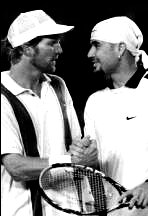 usual for me, but anything is possible after 3 1/2 months away,” he said, referring to the chest injury that ended his 1995 season early and brought an end to his 30-week hold on the No. 1 ranking. “The last three sets were the best tennis I’ve put together so far.” The first set, which began at nearly 11 p.m. Tuesday after a marathon women’s match (C.Rubin d. A.Sanchez-Vicario 6-4, 2-6, 16-14 in 3:33), was interrupted in the 10th game by rain. In the 4th set Courier led 4:3* having lost just three points on serve in that set up to the 9th game, when Agassi won four straight points from 0/30. In very similar circumstances in terms of the scoreline, Courier had been defeated in Australian quarterfinals also a year before by Sampras. The long, hard struggle Agassi has had in Melbourne contrasts with Chang’s clockwork straight-set victories over five previous opponents. The No. 5-ranked Chang makes it look easy. Smaller than his adversaries, Chang scrambles about the court on a pair of legs that could give him a second career in marathons, and plays a wily game, outwitting his opponents. And he has as much endurance as Agassi, though he hasn’t had to call on it lately. He made it to the semis by beating Mikael Tillstrom of Sweden, 6-0, 6-2, 6-4. “I have been put in the position where I’m playing guys that are a bit taller than I am, maybe a little bit bigger, a little bit stronger,” Chang said. “God has given me a good pair of legs, and I think he has given me a good mind to try and think things through.” Agassi has beaten Chang nine of 13 times, but figures that gives him no advantage. “What matters is real clear, which is Friday,” Agassi said. “And what doesn’t matter is real clear, which is today and yesterday.”
usual for me, but anything is possible after 3 1/2 months away,” he said, referring to the chest injury that ended his 1995 season early and brought an end to his 30-week hold on the No. 1 ranking. “The last three sets were the best tennis I’ve put together so far.” The first set, which began at nearly 11 p.m. Tuesday after a marathon women’s match (C.Rubin d. A.Sanchez-Vicario 6-4, 2-6, 16-14 in 3:33), was interrupted in the 10th game by rain. In the 4th set Courier led 4:3* having lost just three points on serve in that set up to the 9th game, when Agassi won four straight points from 0/30. In very similar circumstances in terms of the scoreline, Courier had been defeated in Australian quarterfinals also a year before by Sampras. The long, hard struggle Agassi has had in Melbourne contrasts with Chang’s clockwork straight-set victories over five previous opponents. The No. 5-ranked Chang makes it look easy. Smaller than his adversaries, Chang scrambles about the court on a pair of legs that could give him a second career in marathons, and plays a wily game, outwitting his opponents. And he has as much endurance as Agassi, though he hasn’t had to call on it lately. He made it to the semis by beating Mikael Tillstrom of Sweden, 6-0, 6-2, 6-4. “I have been put in the position where I’m playing guys that are a bit taller than I am, maybe a little bit bigger, a little bit stronger,” Chang said. “God has given me a good pair of legs, and I think he has given me a good mind to try and think things through.” Agassi has beaten Chang nine of 13 times, but figures that gives him no advantage. “What matters is real clear, which is Friday,” Agassi said. “And what doesn’t matter is real clear, which is today and yesterday.”
Semifinals: Houston Chronicle News Services
Defending champion Andre Agassi finally ran out of miracles today when human backboard Michael Chang overcame a rib injury to reach the Australian Open final. The top-ranked Agassi, who clawed from behind in four matches and won three five-setters, played indifferently as a nearly flawless Chang beat him for the first time in a Grand Slam event 6-1, 6-4, 7-6(1). Chang, who will seek his first Grand Slam championship since he won the French Open at 17 in 1989, will play fourth-seeded Boris Becker, who eliminated Mark Woodforde 6-4, 6-2, 6-0 in the other semifinal. Agassi, who had won 12 consecutive matches over two years at the Australian, left the tournament with the No. 1 ranking but without the prize he wanted most – another Grand Slam title. “If you’re No. 1 in the world, it doesn’t mean that you’re safe anymore,” said Chang, the No. 5 seed. “Obviously you have to be out there playing your best tennis.” Agassi obviously wasn’t. He said he decided to “go for the miracle” in coming back from two sets down against Jim Courier in the quarterfinals, but made little effort to do that same against Chang. Although Agassi had beaten Chang in nine of their past 13 matches, and in all three of their Grand Slam matches, there was little  surprise in Chang’s victory this time after they way they had played the past two weeks. Agassi came in after a 3 1/2-month layoff because of a chest muscle injury. Chang came in healthy, winning a tuneup exhibition the week before the Australian Open. “I felt rather flat,” Agassi said. “I’ve played a lot of sets. To play against the wind, against a guy like Michael that’s going to move you from corner to corner, I took a lot of chances. I just didn’t have it. In the wind, the person with the better footwork has the advantage.” Unhampered by strained rib cartilage, Chang served 13 aces against the best returner in tennis, and made only 22 errors to Agassi’s uncharacteristic 60 on a wind-whipped afternoon. Agassi hit lazy drop shots that floated into the net, and he slugged wild shots that soared at times 10 feet wide or long. He made no effort for some balls that might have been within his reach, as if he had nothing left after so many comebacks.is tournament. The adrenaline pulled him through a few matches but today he hit the wall. “If you haven’t got freshness in your legs against Michael Chang, you’ve got a problem because against Michael, you can’t hit one-shot winners.” Chang only played average but then again Andre didn’t make him play very well. “He’ll be disappointed that he’s not here on Sunday, but this means we’ll be watching the Super Bowl.” Chang, despite the rib injury, had fresh legs as he advanced to the final without losing a set in any of his six matches. He hit serves at up to 122 mph, but many of his aces were much slower, well-placed slices that surprised Agassi. Chang served three of those aces to close the second game of the third set. Agassi struggled all match to hold serve, never more than in the ninth of the second set, which went to deuce 11 times before Agassi held with the second of his three aces. Seven years after Chang became the youngest men’s Grand Slam winner in history, he’ll have a chance to win another major. At 5’9, he is an anomaly in the world of taller tennis champs, but the one-inch-longer racket he’s been using the past year has helped him overcome that. Many years later, Agassi confessed in his autobiography “Open”, he didn’t care about that match with Chang because he didn’t want to play against Becker in the final…
surprise in Chang’s victory this time after they way they had played the past two weeks. Agassi came in after a 3 1/2-month layoff because of a chest muscle injury. Chang came in healthy, winning a tuneup exhibition the week before the Australian Open. “I felt rather flat,” Agassi said. “I’ve played a lot of sets. To play against the wind, against a guy like Michael that’s going to move you from corner to corner, I took a lot of chances. I just didn’t have it. In the wind, the person with the better footwork has the advantage.” Unhampered by strained rib cartilage, Chang served 13 aces against the best returner in tennis, and made only 22 errors to Agassi’s uncharacteristic 60 on a wind-whipped afternoon. Agassi hit lazy drop shots that floated into the net, and he slugged wild shots that soared at times 10 feet wide or long. He made no effort for some balls that might have been within his reach, as if he had nothing left after so many comebacks.is tournament. The adrenaline pulled him through a few matches but today he hit the wall. “If you haven’t got freshness in your legs against Michael Chang, you’ve got a problem because against Michael, you can’t hit one-shot winners.” Chang only played average but then again Andre didn’t make him play very well. “He’ll be disappointed that he’s not here on Sunday, but this means we’ll be watching the Super Bowl.” Chang, despite the rib injury, had fresh legs as he advanced to the final without losing a set in any of his six matches. He hit serves at up to 122 mph, but many of his aces were much slower, well-placed slices that surprised Agassi. Chang served three of those aces to close the second game of the third set. Agassi struggled all match to hold serve, never more than in the ninth of the second set, which went to deuce 11 times before Agassi held with the second of his three aces. Seven years after Chang became the youngest men’s Grand Slam winner in history, he’ll have a chance to win another major. At 5’9, he is an anomaly in the world of taller tennis champs, but the one-inch-longer racket he’s been using the past year has helped him overcome that. Many years later, Agassi confessed in his autobiography “Open”, he didn’t care about that match with Chang because he didn’t want to play against Becker in the final…
Final: Steve Wilstein
Second big final was concluded between the AO ’96 finalists, a few month before they’d met in the Masters final (Frankfurt). Boris Becker (won that Masters final in straight sets) blended his uncanny survival instincts with the diving volleys of his youth to win the Australian Open on Sunday, more than a decade after the first of his six Grand Slam titles. Facing a gritty comeback charge by Michael Chang, Becker changed his shoes, his rackets, his shirts, changed the pace and style of his game, did everything he had to do to secure a 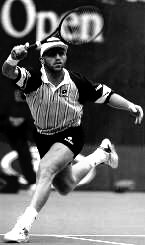 6-2, 6-4, 2-6, 6-2 victory. Becker didn’t race outside the stadium to bellow among the ghost gum trees in Flinders Park after winning, as he did when he captured the Australian championship the first time to become No. 1 in the rankings in 1991. That was the last major title Becker won, though he came close by reaching the Wimbledon final later that year and again last July. Becker’s victory this time, at 28, proved to himself and the world that he’s not too old to win Grand Slam events, that he can keep up rallies even with indefatigable younger players such as the 23-year-old Chang, and that there may be more of this to come. “To tell the truth, I didn’t think I had a Grand Slam left in me,” Becker told the crowd. “My days are counting,” Becker said to Chang, “not yours.” Said Chang: “Boris is very much a champion, both on and off the court. Boris was just too good today.” Becker ‘s path to this title was as hard as any he’s ever had. After losing in the first round here in 1993, skipping ’94, and losing in the first round again last year, Becker got off to a slow start. He survived a five-setter in the first round, came back from two sets down to win another five-setter in the second round, and played close matches the rest of the way. At the start against Chang, it looked for a while as if Becker finally would have an easy time. When they walked on court and posed for the photographers, the 5-foot-9 Chang (175 cm) stood on his toes to make it seem as if he wasn’t so much shorter than the 6-3 Becker (190 cm). Becker, not to be outdone, stood on his toes, too. Becker asserted his size, power and quickness at the net right from the beginning, winning the first four games as Chang tried to figure out ways to beat him. “He surprised me a little,” Chang said, “because Boris is usually a slow starter.” Becker didn’t just dominate with ruthless strength, as he did when he became the youngest Wimbledon winner at 17 in 1985. He dueled on equal terms with Chang from the baseline, waited for Chang to make mistakes, charged in when he had the chances, and jumped on Chang’s second serve to force breaks. “He was playing some good patient tennis,” Chang said, “tennis you don’t ordinarily see from Boris. From the beginning I was a little on the back of my heels.” Chang, saying the rib cartilage he strained several days ago caused no problem, dropped his first service game on a double-fault but was under pressure the whole match as he struggled to save 18 of 23 break points. Chang saved six break points (at 1-all & 2-all) in the second set before, at 4-all, Becker dashed across to put away a forehand volley on what had looked like a winning forehand cross-court pass by Chang from short range. Becker served out the set at love. “I had my opportunities to be able to give that second set a better run than I did,” Chang said. But Chang, once again coming from behind, got to deuce on a forehand pass down the line and gained his first service break of the day on two double-faults by Becker. Becker wound up with seven double-faults, Chang six, and they each served 11 aces. Chang broke Becker again in the third set’s final game with two dazzling service returns and Becker’s last double-fault of the day. Becker’s first break in the third set was frustrating for Chang, who double-faulted at 15/0 after a portable telephone rang in the stands. Chang fell behind 30/40 when he hit a backhand that brought no call from the baseline judge but then was called out by the chair umpire. Chang protested angrily, and again after hitting wide on an attempted forehand pass down the line on game-point. That put Becker ahead 2:1, and he broke again for 5:2 when the speedy Chang couldn’t handle a drop shot and then a forehand cross-court pass. Becker served out the match as Chang ran out of passing shots, missing his first three tries in the game and then hitting long on a backhand cross-court effort on the second match point. No man past the age of 25 had won a Grand Slam title since Stefan Edberg captured his second straight U.S. Open in 1992. Becker now is the oldest player to win a major since 30-year-old Andres Gomez took the French in 1990. Becker also extended his mark as the active player with the most singles titles, 45, including Wimbledon in 1985, ’86 and ’89, the U.S. Open in ’89 and ’91, and the ’91 Australian. Chang was in his third Grand Slam final. Stats of the final.
6-2, 6-4, 2-6, 6-2 victory. Becker didn’t race outside the stadium to bellow among the ghost gum trees in Flinders Park after winning, as he did when he captured the Australian championship the first time to become No. 1 in the rankings in 1991. That was the last major title Becker won, though he came close by reaching the Wimbledon final later that year and again last July. Becker’s victory this time, at 28, proved to himself and the world that he’s not too old to win Grand Slam events, that he can keep up rallies even with indefatigable younger players such as the 23-year-old Chang, and that there may be more of this to come. “To tell the truth, I didn’t think I had a Grand Slam left in me,” Becker told the crowd. “My days are counting,” Becker said to Chang, “not yours.” Said Chang: “Boris is very much a champion, both on and off the court. Boris was just too good today.” Becker ‘s path to this title was as hard as any he’s ever had. After losing in the first round here in 1993, skipping ’94, and losing in the first round again last year, Becker got off to a slow start. He survived a five-setter in the first round, came back from two sets down to win another five-setter in the second round, and played close matches the rest of the way. At the start against Chang, it looked for a while as if Becker finally would have an easy time. When they walked on court and posed for the photographers, the 5-foot-9 Chang (175 cm) stood on his toes to make it seem as if he wasn’t so much shorter than the 6-3 Becker (190 cm). Becker, not to be outdone, stood on his toes, too. Becker asserted his size, power and quickness at the net right from the beginning, winning the first four games as Chang tried to figure out ways to beat him. “He surprised me a little,” Chang said, “because Boris is usually a slow starter.” Becker didn’t just dominate with ruthless strength, as he did when he became the youngest Wimbledon winner at 17 in 1985. He dueled on equal terms with Chang from the baseline, waited for Chang to make mistakes, charged in when he had the chances, and jumped on Chang’s second serve to force breaks. “He was playing some good patient tennis,” Chang said, “tennis you don’t ordinarily see from Boris. From the beginning I was a little on the back of my heels.” Chang, saying the rib cartilage he strained several days ago caused no problem, dropped his first service game on a double-fault but was under pressure the whole match as he struggled to save 18 of 23 break points. Chang saved six break points (at 1-all & 2-all) in the second set before, at 4-all, Becker dashed across to put away a forehand volley on what had looked like a winning forehand cross-court pass by Chang from short range. Becker served out the set at love. “I had my opportunities to be able to give that second set a better run than I did,” Chang said. But Chang, once again coming from behind, got to deuce on a forehand pass down the line and gained his first service break of the day on two double-faults by Becker. Becker wound up with seven double-faults, Chang six, and they each served 11 aces. Chang broke Becker again in the third set’s final game with two dazzling service returns and Becker’s last double-fault of the day. Becker’s first break in the third set was frustrating for Chang, who double-faulted at 15/0 after a portable telephone rang in the stands. Chang fell behind 30/40 when he hit a backhand that brought no call from the baseline judge but then was called out by the chair umpire. Chang protested angrily, and again after hitting wide on an attempted forehand pass down the line on game-point. That put Becker ahead 2:1, and he broke again for 5:2 when the speedy Chang couldn’t handle a drop shot and then a forehand cross-court pass. Becker served out the match as Chang ran out of passing shots, missing his first three tries in the game and then hitting long on a backhand cross-court effort on the second match point. No man past the age of 25 had won a Grand Slam title since Stefan Edberg captured his second straight U.S. Open in 1992. Becker now is the oldest player to win a major since 30-year-old Andres Gomez took the French in 1990. Becker also extended his mark as the active player with the most singles titles, 45, including Wimbledon in 1985, ’86 and ’89, the U.S. Open in ’89 and ’91, and the ’91 Australian. Chang was in his third Grand Slam final. Stats of the final.
*****************************************


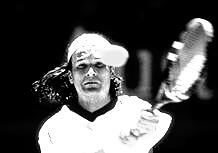
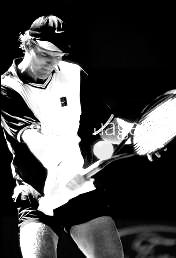
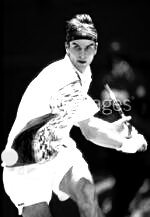



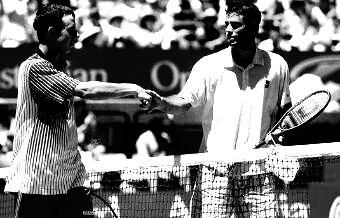
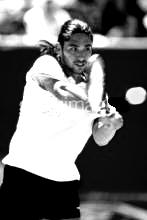
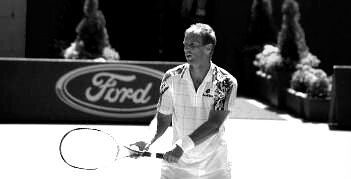


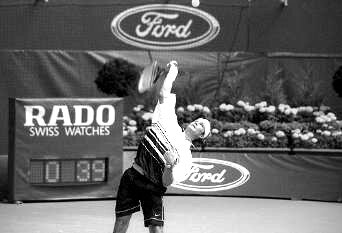

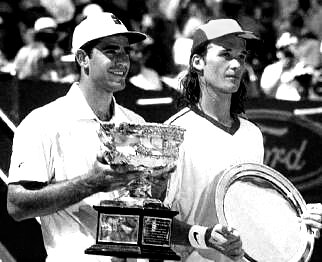
YT matches:
1996
Short clips in French:
Becker vs. Rusedski
Chang vs. Raoux
Fleurian vs. Krajicek
Courier vs. Woodbridge
Becker vs. Woodforde
Chang vs. Agassi
English:
Philippoussis vs. Sampras
Tillstrom vs. Muster (full match)
Agassi vs. Courier (full match)
Becker vs. Chang
1997 (full matches)
Sampras vs. Hrbaty
Muster vs. Ivanisevic
Sampras vs. Muster
Sampras vs. Moya